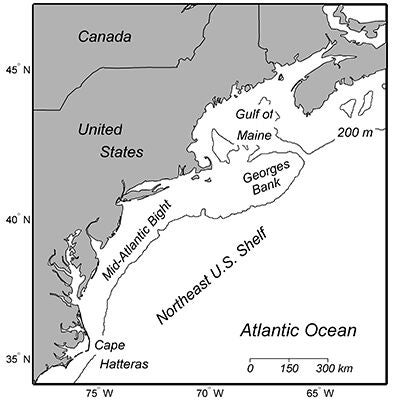Study says Northeast fisheries threatened by climate change
 MAP CREDIT / PLoS ONE
A new study shows fish on the Northeast U.S. Continental Shelf are at risk from the effects of climate change, like ocean warming and acidification.
MAP CREDIT / PLoS ONE
A new study shows fish on the Northeast U.S. Continental Shelf are at risk from the effects of climate change, like ocean warming and acidification.
Northeast fisheries, from Maine lobster to Atlantic cod, are extremely vulnerable to climate change, a new study from the National Oceanic and Atmospheric Administration found.
The study, published in the journal PLoS ONE, looked at the vulnerability to climate of 82 fish and invertebrate species in the Northeast U.S. Shelf, which includes the Gulf of Maine. NOAA found that more than 40 of the 82 species from North Carolina to the Gulf of Maine are at “very high” or “high” risk from warming waters, ocean acidification, sea level rise and other climate change impacts.
Fisheries in the region generate some $200 billion and support 1.7 million jobs annually, so the impact is not only to the species, but to local and regional economies.
Among the other species at risk are Atlantic salmon, winter flounder, bay scallops and ocean quahogs. The study found that the Atlantic cod, for example, lost some 90% of its population over the last three decades.
“The results show that climate change presents significant challenges to the region’s fishery management and to its ability to sustain fishing communities,” Jonathan Hare, a NOAA oceanographer and lead author of study, told The Boston Globe.
The study also found that 80% of the species NOAA studied are likely to move beyond their normal habitats. Black sea bass and summer flounder already have been found in waters further north than usual in recent years. Such changes could impact what fish eat and how the government manages them.
“This is reshuffling the ecosystem, and we don’t have a good understanding of what the consequences will be,” Hare told the Globe.
The study may help commercial fishermen, as it indicates fish population declines may be due to fish moving because of climate change effects rather than overfishing.
“It’s good to see that just because the fish aren’t there, it doesn’t mean that they are overfished,” said Robert Vanasse, executive director of Saving Seafood, a Washington-based group that represents commercial fishermen, told the Globe. “This study shows that it could also mean that the fish have moved.”
Read more
Climate change means big changes for Maine businesses, residents
Bigelow Laboratory launches venture research centers
Jump in domestic lobster processing could drop prices
Questioning our Changing Oceans' panel discussion at forum
Research institute forecasts early lobster season start
Coalition challenges approval of genetically engineered salmon









Comments